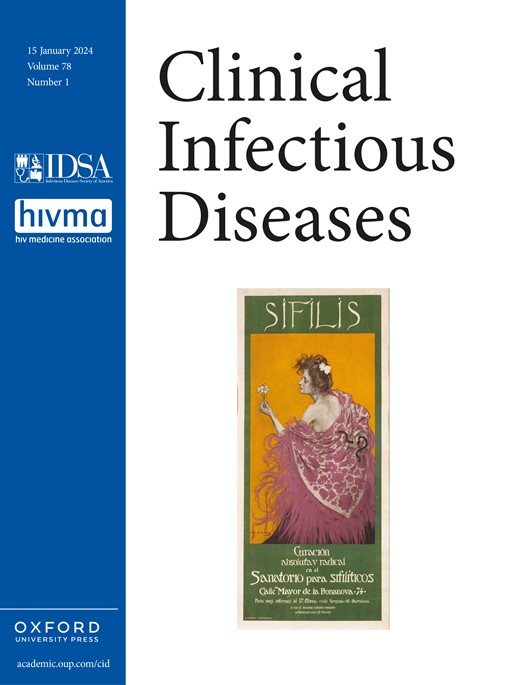Estimated Vaccine Effectiveness for Respiratory Syncytial Virus-Related Acute Respiratory Illness in Older Adults: Findings From the First Postlicensure Season.
IF 7.3
1区 医学
Q1 IMMUNOLOGY
引用次数: 0
Abstract
BACKGROUND Respiratory syncytial virus (RSV) is an important cause of severe respiratory illness among older adults. Previously, we showed that the RSVpreF vaccine (Abrysvo; Pfizer) prevents RSV-related lower respiratory tract disease-related emergency department (ED) visits/hospitalizations in older adults. Here, we evaluate its effectiveness against additional acute respiratory illness (ARI) end points, including severe disease, among high-risk persons. METHODS This was a retrospective test-negative case-control study of adults aged ≥60 years at Kaiser Permanente Southern California with ARI ED visits/hospitalizations, defined by International Classification of Diseases, Tenth Revision discharge code, from 24 November 2023 to 9 April 2024. Case patients tested positive for RSV. Controls in the primary analysis tested negative for RSV, human metapneumovirus, influenza, and severe acute respiratory syndrome coronavirus 2 and positive for a non-vaccine-preventable pathogen. The exposure was RSVpreF receipt ≥21 days before ARI diagnosis. Vaccine effectiveness (VE) was calculated from adjusted odds ratios via multivariable logistic regression. RESULTS Overall, 8965 ARI ED visits/hospitalizations with RSV testing were included; 7.8% of patients were RSV positive, among whom 0.3% had received RSVpreF, compared with 3.6% of controls. The adjusted VE was 92% (95% confidence interval, 64%-98%). We estimated similar VE among patients with risk conditions (92% [95% confidence interval: 65%-98%]), the oldest subgroup (age ≥75 years; 95% [60%-99%]), those with critical outcomes (intensive care unit admission, mechanical ventilation, respiratory failure, vasopressor use, or death; 90% [16%-99%]), and those with severe disease (defined as ED visit or hospitalization requiring oxygen; 92% [35%-99%]). CONCLUSIONS Among older adults, RSVpreF demonstrated high VE against RSV-related ARI hospitalization or ED visits, including among high-risk subgroups, and against severe outcomes. RSV vaccination programs can protect groups at the highest risk of severe disease.估计疫苗对老年人呼吸道合胞病毒相关急性呼吸道疾病的有效性:来自第一个许可季节的发现
背景呼吸道合胞病毒(RSV)是老年人严重呼吸道疾病的重要病因。先前,我们发现RSVpreF疫苗(Abrysvo; Pfizer)可以预防老年人与rsv相关的下呼吸道疾病相关的急诊科(ED)就诊/住院。在这里,我们评估了其对高危人群中其他急性呼吸道疾病(ARI)终点的有效性,包括严重疾病。方法:该研究是一项回顾性试验阴性病例对照研究,研究对象为2023年11月24日至2024年4月9日期间,在南加州凯撒医疗机构就诊/住院的≥60岁的ARI ED患者,根据国际疾病分类第十版出院代码进行定义。病例患者呼吸道合胞病毒检测呈阳性。初步分析中的对照检测RSV、人偏肺病毒、流感和严重急性呼吸综合征冠状病毒2呈阴性,一种非疫苗可预防病原体呈阳性。暴露时间为ARI诊断前接受RSVpreF≥21天。疫苗有效性(VE)通过多变量logistic回归从校正优势比计算。结果共纳入8965例急性呼吸道感染急症就诊/住院并进行RSV检测;7.8%的患者为RSV阳性,其中0.3%的患者接受了RSVpreF治疗,而对照组为3.6%。校正后的VE为92%(95%置信区间,64%-98%)。我们估计有危险状况的患者(92%[95%可信区间:65%-98%])、年龄最大的亚组(年龄≥75岁;95%[60%-99%])、危重结局(重症监护病房入院、机械通气、呼吸衰竭、血管加压剂使用或死亡;90%[16%-99%])和重症患者(定义为急诊科就诊或住院需要吸氧;92%[35%-99%])的VE相似。结论:在老年人中,RSVpreF对rsv相关的ARI住院或ED就诊表现出高VE,包括在高危亚组中,以及对严重结局的VE。呼吸道合胞病毒疫苗接种计划可以保护患严重疾病风险最高的人群。
本文章由计算机程序翻译,如有差异,请以英文原文为准。
求助全文
约1分钟内获得全文
求助全文
来源期刊

Clinical Infectious Diseases
医学-传染病学
CiteScore
25.00
自引率
2.50%
发文量
900
审稿时长
3 months
期刊介绍:
Clinical Infectious Diseases (CID) is dedicated to publishing original research, reviews, guidelines, and perspectives with the potential to reshape clinical practice, providing clinicians with valuable insights for patient care. CID comprehensively addresses the clinical presentation, diagnosis, treatment, and prevention of a wide spectrum of infectious diseases. The journal places a high priority on the assessment of current and innovative treatments, microbiology, immunology, and policies, ensuring relevance to patient care in its commitment to advancing the field of infectious diseases.
 求助内容:
求助内容: 应助结果提醒方式:
应助结果提醒方式:


